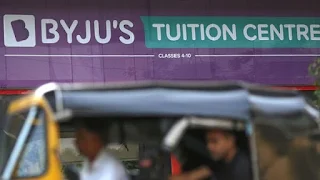Saturday, April 13, 2024
Iran launches barrage of strikes toward Israel
Airspace closures throughout the Middle East ground, divert flights as Iran launches drone attack on Israel
Airspace closures throughout the Middle East ground, divert flights as Iran launches drone attack on Israel
KEY POINTS
Friday, April 12, 2024
Drug shortages reach record high in US
Drug shortages reach record high in US
 |
| There are 323 drugs with active shortages in the US, surpassing the previous record high from 2014 |
There are more active drug shortages in the United States than ever, according to data from the American Society of Health-System Pharmacists and the University of Utah Drug Information Service.
Bitcoin Mining Braces For A Shakeout As Halving Nears
Bitcoin Mining Braces For A Shakeout As Halving Nears
The approaching bitcoin halving is sending some bitcoin mining companies running for cover.
Others, meanwhile, are rushing out to score good deals.
"We're really paying attention to the full spectrum right now of assets and companies that might be more on that marginal cost curve so that we can ensure we're prepared for any types of opportunities that may arise," Adam Sullivan, CEO of bitcoin mining company Core Scientific (CORZ), told Investor's Business Daily.
Most industry watchers expect the reduced reward for bitcoin mining to push some out of the business. That, in turn, could lead to a glut of specialized mining hardware. "As those marginally profitable miners start to experience cash-flow issues, it can be a great opportunity for Core Scientific to buy machines at discounted prices," said Sullivan.
Sullivan says the halving will kick off a massive equipment buying frenzy in the bitcoin mining sector, driven by a need for modernized, efficient mining hardware as the reward drops. "You're going to see an acceleration on ASIC demand, people rotating into newer generation machines," said Sullivan.
The Big Bitcoin Mining Rig Demand Blowup
ASICs, or Application-Specific Integrated Circuit processors, are the type of chips powering the most modern and specialized mining rigs. The first mining-specific ASIC rigs appeared in 2013, according to CoinDesk, and are solely designed to handle the cryptographic math needed to "mine" bitcoin. ASICs soon supplanted GPUs from Nvidia (NVDA) and AMD (AMD), which had themselves replaced microprocessors in ordinary, at-home computers. But with every new wave of technology, efficiency remained the goal: more crypto calculations with less energy.
Some of the currently top-rated mining chips and computers come from China-based players, including Bitmain, MicroBT and Cannan (CAN).
The influx of new mining hardware permits miners some flexibility in dealing with their energy costs. Industrial bitcoin mining also considers the cost of electricity in different locations throughout the U.S. "We're taking the most efficient machines and putting them to our highest uptime locations," said Sullivan. "We're then taking our least efficient machines and allocating them to our facilities where we can be much more selective about the power costs." Core Scientific says it currently operates facilities in Georgia, Kentucky, North Carolina, North Dakota and Texas.
Prior bitcoin halvings occurred in 2012, 2016 and 2020. Bitcoin's next halving appears set to occur later this month.
Bitcoin's halving is a function built into the cryptocurrency from the onset, laid out by reputed creator Satoshi Nakamoto in the original 2008 bitcoin white paper. Bitcoin is "mined" by verifying transactions across the bitcoin network, creating a block that's added to the chain of previous transactions. (This creates the so-called blockchain.) When other bitcoin miners agree that the block is valid, the block becomes a bitcoin that goes to the first miner. Meanwhile, the block is itself used to hash new transactions.
Estimates call for April's halving to reduce mining rewards to 3.125 bitcoin per block, down from 6.25 per block. Because bitcoin mining occurs at a steady rate, halvings tend to occur roughly every four years.
"Mining companies are going to be making very large purchases to ensure the long-term stability of their business and to make sure they can survive through these difficult times of the year," said Sullivan.
Weathering Difficult Times In Bitcoin Mining
Core Scientific is no stranger to lean times in crypto. The Austin, Texas-based bitcoin miner filed for bankruptcy during the 2022 drop in crypto prices popularly called the "crypto winter." Core Scientific continued its mining operations through the bankruptcy, and emerged in January, reclaiming the ticker CORZ.
Core Scientific currently has a market cap of $555.9 million, well below its $4.3 billion market debut via special purpose acquisition company, or SPAC, in 2021. The mining company's stock saw its shares spike to a year-to-date high of 4.29 in March before reversing to a low of 2.95 after the company reported its first post-bankruptcy earnings. Core Scientific is unranked in its Computer Software group, although it does hold a Composite Rating of 84, according to IBD Research.
The top publicly traded miners include Riot Platforms (RIOT) and Marathon Digital (MARA).
Core Scientific remains optimistic it can weather the halving and keep its spot as one of the largest bitcoin miners. "We know we'll have an opportunity to refresh our machines post-halving, putting us in a really strong position to continue to grow to 2025," said Sullivan. "We know what it takes from a capital allocation perspective and we know what it means to put cash on the balance sheet to be able to take advantage of bear markets versus being concerned about profitability."
"
Monday, April 8, 2024
Back Indian Railways to run Summer Special Vande Bharat Express trains in April. Check out routes, timings, and stops
Back
Indian Railways to run Summer Special Vande Bharat Express trains in April. Check out routes, timings, and stops
 |
| A special Vande Bharat train will run from Chennai Egmore to Nagercoil on Fridays, Saturdays, and Sundays of this month for the convenience of passengers |
Indian Railway has announced that it will run several summer special Vande Bharat Express trains in April 2024 for the convenience of passengers planning to go to their hometowns or tourist destinations.
Amazon’s total Washington state employment declines for the first time, new numbers show
Amazon’s total Washington state employment declines for the first time, new numbers show
 |
| A logo in the lobby at Amazon’s re:Invent building in Seattle, March 2024. |
 |
| Amazon’s global employment has plateaued in recent years after rapid growth in the prior decade |
TSMC Will Receive $6.6 Billion to Bolster U.S. Chip Manufacturing
TSMC Will Receive $6.6 Billion to Bolster U.S. Chip Manufacturing
 |
| A new Taiwan Semiconductor Manufacturing Company plant under construction in Phoenix, Ariz., in December 2022.Credit...T.J. Kirkpatrick for The New York Times |
Sunday, April 7, 2024
BITCOIN
BITCOIN
‘Overheated’ Bitcoin market is cooling – Time to bet on BTC’s price again?
There is scope for fresh longs entering the market, paving way for a sustained push north on the charts…
🔸Drops in funding rates, OI indicated a shakeout of over-leveraged bullish traders
🔸Market mood changed from one of extreme greed to greed
Bitcoin [BTC] retreated from its previous all-time highs (ATH) this week, dropping by 3.23% to the $67k zone, according to CoinMarketCap. Right now, bullish market participants are eagerly awaiting a rebound to $73k – A level last hit in mid-March.
However, while the king coin languishes on the charts, some of its market indicators are still flashing green.
Funding rates normalize
According to J. A. Maartunn, a contributor at on-chain analytics platform CryptoQuant, Bitcoin’s funding rates dropped sharply over the week. In fact, at press time, it was at levels which he deemed as “neutral.”
Typically, drops in funding rates indicate a shakeout of over-leveraged bullish traders. The funding rates soared when BTC hit its new ATH mid-March, a sign of an overheated market. However, with funding rates normalizing, and prices still around $67k, there is now scope for fresh longs entering the market, paving the way for a sustained push north.
The 11% decline in Open Interest (OI) in Bitcoin futures over the week, as per AMBCrypto’s analysis of Coinglass‘ data, also reflected the exit of over-leveraged long positions.
Euphoria starts to subside
The cool-off was further demonstrated by the shift in market mood from “extreme greed” to ” greed” over the week, as per the Crypto Fear and Greed Index. Typically, when the market becomes extremely greedy, it means it’s due for a correction.
Another bullish trigger for Bitcoin?
Saturday, April 6, 2024
U.S. and China to hold talks on 'balanced growth' amid overcapacity concerns, Yellen says PUBLISHED SAT, APR 6 2024 3:
U.S. and China to hold talks on 'balanced growth' amid overcapacity concerns, Yellen says
‘Outrage against international law’: Mexico breaks diplomatic ties with Ecuador over embassy raid
‘Outrage against international law’: Mexico breaks diplomatic ties with Ecuador over embassy raid
 |
Gaza: Israel urged to publish full report on aid worker deaths
Gaza: Israel urged to publish full report on aid worker deaths
 |
| Seven aid workers were killed in three drone strikes on a convoy of vehicles |
 |
Thursday, April 4, 2024
Google AI content under premium now? Search engine says it's 'not considering ad-free experience'
Google AI content under premium now? Search engine says it's 'not considering ad-free experience'
 |
| Google logo and AI Artificial Intelligence words are seen in this illustration |
Byju’s seeks arbitration over NCLT trial in dispute with investors
Byju’s seeks arbitration over NCLT trial in dispute with investors
Trump leads Biden in six swing states amid stiff presidential battle, poll finds
Trump leads Biden in six swing states amid stiff presidential battle, poll finds
In the poll, the negative views for Biden outweighed the positive ones by at least 16 percentage points and more than 20 points in four of the states.
 |
| Donald Trump has an edge over Joe Biden in six of the seven swing states, new poll by WSJ finds(AFP) |
The journal added that the results were similar in a “one-on-one matchup” with the US president on the ballot that included third-party and independent candidates. Meanwhile, in the seventh state, Wisconsin, where Biden was already ahead by 3 points on a multiple-candidate ballot, the two rivals were tied in a “head-to-head contest,” per Reuters.
Taking Stock: Sensex, Nifty close at new highs, all eyes on RBI policy
Taking Stock: Sensex, Nifty close at new highs, all eyes on RBI policy
The Indian benchmark indices climbed to record highs, squandered some of the gains but still managed to close in the green in a volatile session of trade on April 4, a day ahead of Reserve Bank of India (RBI) policy announcement.
About Me
Blog Archive
- December 2024 (2)
- April 2024 (56)
- March 2024 (63)
- February 2024 (1)
Labels
- ‘ day stories
- ‘I salute him for…’: Mamata Banerjee's 'top bosses' jibe at BJP after Arun Goel resignation as election commissioner
- account holder
- AI
- Airport
- Airport road
- Amazon
- Amazon job
- America
- America economic
- America government
- application
- April 8 solar
- Bank
- Bank of India
- Banking
- Bihar
- Bitcoin
- BJP
- bot
- BTC
- business exicutive
- Cooling
- crypto
- crypto free
- Crypto Gold
- crypto Trading
- Daily News
- day news
- day stories
- Delhi
- Donald Trump
- Dubai
- east
- east side
- Easter
- Economic
- education
- Election
- Election 2024
- Election bond data
- election news
- Electoral Bonds
- Electoral Bonds: 5 key highlights of SC verdict rejecting SBI's time-extension plea to disclose details
- Flipkart
- Flipkart marketing
- food India
- free fire
- gameing
- giotous
- Gold
- good Friday
- Google money
- Government
- heart
- Holi
- Hollywood
- India
- India election
- India election BJP politics election news
- India function
- India politics
- Indian
- Indian government
- Indian Navy
- Indian News
- investment
- IPL
- Iran
- Isis
- Israel
- Jappan
- judge
- Kejriwal's ‘vote bank politics’ charge on BJP over CAA implementation
- Litecoin
- Lottery
- Market
- market trading
- Marketing
- Modi
- Money earn
- money election
- Muslims
- nature
- NCLT
- New downtown
- New York
- news of India
- news politics
- news World
- Nigeria
- notch logest loss
- Ocean
- Online
- online job
- Online tution
- Oscars
- Phone
- PM inaugurates 15 new airport projects
- political
- political science
- political science USA
- Politics
- politics election world News
- population day
- Power full country
- Rain
- Samsung s23
- SBI
- SBI Bank
- SBI Bank Indian
- science
- science USA
- share market
- SLIM
- smoke free
- social media
- space
- Space news
- stack
- stack trading
- stock market
- Stock Market Today: All You Need To Know Going Into Trade On March 11
- stories space
- Summer
- today News
- trading
- trading economic
- Trump
- truth social
- U.S
- UAeE
- UK
- Ukraine
- US
- Us.
- usa
- weather
- weather news
- work and time
- world
- world business
- world economic
- world market
- World news
- world politics
- World population
- Zomato
Search This Blog
Popular Posts
|
|
















